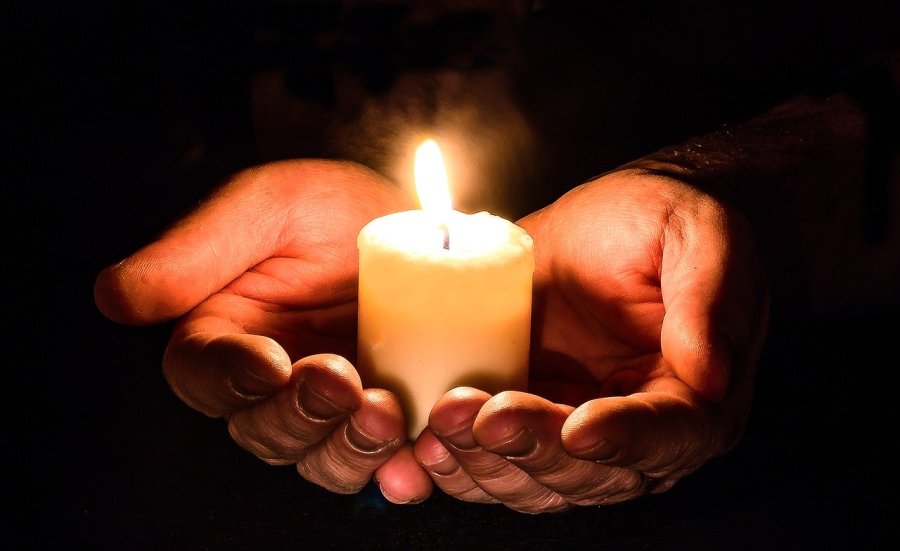
We can’t control our world, our family’s lives, even our own life right now, can we? We can’t know when or where the Coronavirus will hit. We can’t know if we’ll get it, or our neighbor, or our best friend, or our coworker. We can’t know if we’ll come through this time financially whole or if the financial condition of the country and world will collapse. And this is scaring many of those I see or those I read about in the news or that I hear from on Facebook or other social media accounts. And I get it – there is much uncertainty. This morning, though, I wondered to myself – but can we ever? Can we truly ever have power and control over all that happens to us? All that we experience, think, and feel? All that we so often trudge through life trying to control. Our boss? Our job? Our health? Our financial condition? Or is it possible, just possible, it’s an illusion of control? And that the truth we are living right now – that we cannot control the spread of COVID-19 more than following the suggestions of medical professionals and mandates of our government is the reality we live each and every day?
Dr. Viktor Frankl was a psychiatrist who was put in a prisoner camp in Germany during the time of Adolph Hitler. A man of Jewish faith and lineage, he was in the group abhorrently victimized and often killed by those under Hitler. And from him came some of the most profound writing in the area of existential psychology – or the psychology of meaning and experience of life. He survived the camp, a feat beyond my imagination, and stated, “When we are no longer able to change a situation, we are challenged to change ourselves”. Ah – here is the kernel of hope we do have, we can always change ourselves, our reactions. He went on to elaborate: “Everything can be taken from a man [person] but one thing: the last human freedoms – to choose one’s attitude in any given set of circumstances, to choose one’s way”. And this is how he survived the experience in Auschwitz. And helped many others to do so – to choose their attitude to keep trying, one step, one day at a time; and to assist others by noticing them, handing them a crust of their dried bread, or a sip of the tiny bit of water they were given.
A choice – we, too have choices. Are we going to share with others compassion and love and a safe place to share what isolation is like? Or what living at home 24 hours with children and/or spouse is like? Either can be very challenging. Are we going to be supportive of the grocery store clerks and employees – or grumble that we didn’t find what we wanted? It’s a choice, isn’t it? I will say I can sometimes be tired and grumble when someone doesn’t acknowledge what I’m experiencing – but how would they? We’re each unique and experiencing this time differently. So, I need to back up and possibly share it and ask for understanding or at least respect for my experience and apologize for the grumble.
Kristen Neff talks about self-compassion, and Viktor Frankl about compassion towards others. But Neff makes an excellent point – if we don’t have it and show it to ourselves first, how will we ever share it with others? So, as we are facing days that are long, with limited control but room for personal choice in attitude, perhaps a little self-compassion would be a good first step. Especially through this next week when many who are Jewish cannot celebrate Passover as they are accustomed to and Christians cannot celebrate Easter as they are. We will need to choose attitude and show compassion.
Kristen Neff discusses this from a place of self-compassion, Brene Brown from a place of shame and working to change that and let go of that, and Viktor Frankl from a place of making a choice in our experiences about our attitude. All three, interestingly, have similarities in what to do.
- Notice what you’re feeling. Be with it in the moment. Be present and mindful so that you are aware and do not act out, hopefully, towards another. So, for example, when I am feeling lonely facing Easter without the family and traditions we usually share, I need to sit with that. Feel the pain, the disappointment, the loneliness.
- Being kind to yourself in language is also important. Rather than the voice that might say, “Oh grow up, it’s one holiday. You’re fine. At least you’re not in the hospital and dying of Covid-19”; we need to instead say, “I’m having a hard time. This is something I haven’t experienced so it feels new and lonely. And it’s a change – I struggle with change in family tradition. So, I need to be even kinder in planning and deciding how and what I will do Easter Sunday”.
- Name the feeling and share it with some safe person in my life. It might be in prayer. It might be in text to my best friend. It might be a call to a family member to connect at least that way and share and listen to what they are experiencing as we face the next 7 days. (This is unique to Brene Brown’s idea of coming out of the shame spiral by facing it and sharing it.)
- Decide how with what attitude to face the next 7 days and what choices are available. For example, reaching out to others is something Viktor Frankl recommends as we reach out in love. Not in guilt or caretaking or shame. But as he says, “Love is the ultimate and the highest goal to which [we] can aspire”. This means both the love in self-compassion above, but also the love in reaching out. Perhaps something special to do with the children over the coming weekend. Perhaps sending cards of love to family we cannot see. Maybe planning our own special day of ritual and celebration and sharing it in love for the other(s) we might be with – even if that is ourselves. Nurturing the sense of self-compassion, and care.
So how will you face your own attitudes this week? How will you remain mindful of what you are experiencing? What change can you commit to? What are the steps you might take to show yourself and others compassion? I would encourage you to write them down. Post them, put them in front of you, and lovingly remind yourself of them each day.
Warmly and with compassion,
Dr. Beth
PS: Want to learn more about these 3 theorists and clinicians? I suggest the following books:
Daring Greatly: How the Courage to be Vulnerable Transforms the Way We Live, Love, Parent, and Lead by Brene Brown
Man’s Search for Meaning by Viktor Frankl
Self-Compassion: The Proven Power of Being Kind to Yourself by Kristen Neff



